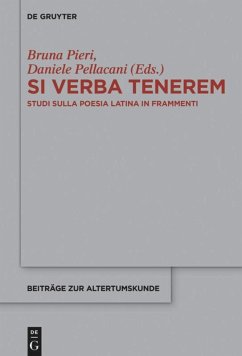We cannot fully understand the development of Roman poetry if we ignore the works that survive only in fragments, or that are known only through quotations or allusions. During the last two decades, studies on this topic have been fostered by the collections of Courtney, Hollis and Blänsdorf, but there is still room for further improvement in editing and discussing the fragments of the Latin non-dramatic poets. This volume gathers together ten essays, most of which were discussed in a Seminar held in Bologna in 2014; they can be seen as case studies that confront the main issues of the research on Roman poetic fragments, such as textual criticism and interpretation, authorship, prosody and colometry, literary genre, and the connection between quotation and context. These papers do not deal only with texts already known, but suggest some new additions to the corpus of the Fragmenta poetarum Latinorum. In a methodological introduction, the editor also provides an up-to-date review of the scholarship on the subject, that aims to supplement Blänsdorf's bibliography. For all these reasons, this volume will be of primary relevance to students and scholars in Classical philology.
Bitte wählen Sie Ihr Anliegen aus.
Rechnungen
Retourenschein anfordern
Bestellstatus
Storno

